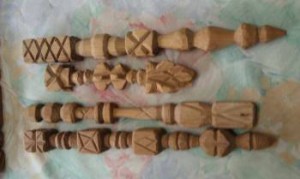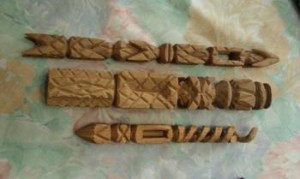

He was in a installing a gas, a-a- gas in a basement, or hot water heater and he didnt know it but it was, the pilot light was still on he light a match and the explosion was pretty bad. He was burned all over and one hand was burned real bad. But he started to carve things to get his hand flexible and those are from him.
Why would it help his hands when asked why he thought it would help his hands she answered: It flexed it, it gave his hand exercise
maybe somebody said if you exercise your hand it will be more usable and it was. Originally it was kinda like a claw [she shows me her hand in a clenched-claw shape] it was really bad.
The informant as well as her father were born in rural Iowa and are of Czech decent – more specifically Bohemian decent. The informant is a 93-year-old housewife who has lived in the Los Angeles area since the 1950’s.
When asked who told him that whittling would help his hands grow in dexterity the informant didn’t know. In fact, I asked several members of the family and no one knew. The informant and others in the family reacted defensively when I asked, answering right away that it did indeed help him. When I asked where he got the designs from the informant said that she thought he just got them out of his head.
Whittling is a common American pastime, especially around the 1920’s and 30’s (Reynolds 80). This was the era that the Czech American folk artist was whittling away, starting with his wife’s broom (much to her dismay). This carving of whatever piece of wood could be found was observed also in a Folk Art Museum in New York state (Rita 19). As far as the folk remedy for a severely disabled hand, the origins of this are less clear. C.J Reynolds, D.D.S in a Popular Science article from April 1924 mentions that whittling helped with improving his “manual dexterity” so key to his profession as a dentist (80). The pieces picture above actually somewhat resemble some of those picture in the article. Something particularly striking about the pieces is their clear use of geographic shapes such as squares and triangles. After doing some research I found that the dominant use of these shapes are similar to those used in chip-carved spoons found in Eastern Europe – which were also carved with a simple knife (Sentance and Sentance, 118). These spoons, however only took small chips of the wood out, leaving the surface nearly flat still while the angles in the above pieces are far more three dimensional. This three dimensional quality more resembles the totem poles made by Native Americans and the walking sticks made by African Americans in the south( Sentance and Sentance, 24-25; Burrison, 70). In this way these pieces can be seen as a mixture of both old world and new world influences.
On another level, these wooden carvings are entering our family as cherished folk objects whose story has been passed down four generations now. My grandmother offered each of her over a dozen grandchildren a few of the more than 50 that she has left. It is almost a mark of family identity that we know that our Czech grandfather made them. The story itself could perhaps be seen as a family member triumphing in the face of adversity by making something beautiful in order to counteract this terrible explosion that happened.
Burrison, John A. Shaping Traditions: Folk Arts in a Changing South. Athens, Georgia: University of Georgia Press, 2000. 70.
Reif, Rita. (1975, April 12). Antiques: wood carving: 139 ‘varied’ findings in new york state on view at folk art museum. New York Times, p. 19.
Reynolds, C.J., D.D.S. “Fun and Profit in My Jack-Knife.” Popular Science. April 1924, 80.
Sentance, Bryan, and Polly Sentance. Craft Traditions of the World: Locally Made, Globally Inspiring. London: Thames & Hudson, Ltd., 2009. 118-119. Print.


